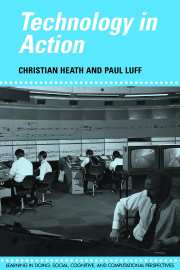Book contents
- Frontmatter
- Contents
- Preface
- 1 Technology and social action
- 2 Documents and professional practice: ‘bad’ organisational reasons for ‘good’ clinical records
- 3 Animating texts: the collaborative production of news stories
- 4 Team work: collaboration and control in London Underground line control rooms
- 5 The collaborative production of computer commands
- 6 ‘Interaction’ with computers in architecture
- 7 Reconfiguring the work space: media space and collaborative work
- 8 Organisational interaction and technological design
- References
- Index
8 - Organisational interaction and technological design
Published online by Cambridge University Press: 22 September 2009
- Frontmatter
- Contents
- Preface
- 1 Technology and social action
- 2 Documents and professional practice: ‘bad’ organisational reasons for ‘good’ clinical records
- 3 Animating texts: the collaborative production of news stories
- 4 Team work: collaboration and control in London Underground line control rooms
- 5 The collaborative production of computer commands
- 6 ‘Interaction’ with computers in architecture
- 7 Reconfiguring the work space: media space and collaborative work
- 8 Organisational interaction and technological design
- References
- Index
Summary
Everyone agrees that institutions should be the central object of sociological study, then promptly defines them in such a way that the most interesting and significant kinds of human collective enterprises are left out of account. The term institution, in short, suffers from an overdose of respectability, if not of hypocrisy: perhaps from overmuch definition and classification.
Hughes (1971: 52)Instead of pushing aside the older ethnographic work in sociology, I would treat it as the only work worth criticising in sociology; where criticising is giving some dignity to something. So, for example, the relevance of the works of the Chicago sociologists is that they do contain a lot of information about this and that. And this-and-that is what the world is made up of.
Sacks (1964 (1992): 27)Introduction
The diverse substantive and conceptual concerns of workplace studies are reflected in their increasing significance to contemporary research and practice in a broad range of disciplines and fields. It has been suggested, for example, that naturalistic studies of technology in use, and more generally organisational conduct, are having a growing influence on cognitive science, and leading to a recognition of the importance of situated practice for human thinking. We also find that certain developments in both AI and HCI have arisen, in part, through the realisation that the contingent and, in particular, socially organised circumstances of human conduct bear upon information processing and representation.
Information
- Type
- Chapter
- Information
- Technology in Action , pp. 217 - 251Publisher: Cambridge University PressPrint publication year: 2000
